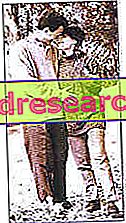Related articles: Agnosia
Definition
Agnosia is the inability to recognize objects already known by one or more senses (hearing, taste, smell, touch or sight). This symptom manifests itself in the absence of disturbances in the afferent sensory systems which, as a rule, collect and transmit stimuli to the primary sensory centers. Agnosia is therefore the result of damage (eg ischemia, neoplasia or trauma) or a degenerative process that involves the areas of the brain responsible for perception, identification and memory.
Agnosia can occur in patients with dementia, epilepsy or encephalitis.
Occipito-temporal lesions can cause the inability to recognize the objects seen, independently of peripheral disorders of the visual apparatus ( visual agnosia ), familiar places ( topographic agnosia ) or color blindness ( achromatopsia ). Patients with right temporal lesions, on the other hand, may lose the ability to recognize objects from the sound they produce ( auditory agnosia, eg a ringing telephone) or report an altered perception of music ( amusia ). The inability to recognize objects by touch without the aid of sight ( tactile agnosia or astereoagnosia ) can be observed both in the presence of lesions affecting the sensitive areas of the parietal lobe, and in the presence of sensory pathway lesions.
Possible Causes * of Agnosia
- Brain aneurysm
- Transient ischemic attack
- Vascular dementia
- Cerebral hemorrhage
- Encephalitis
- Tick-borne encephalitis (TBE)
- Japanese encephalitis
- Stroke
- Cerebral ischemia
- Creutzfeldt-Jakob disease



